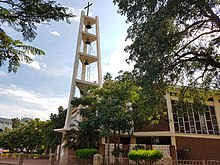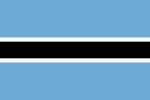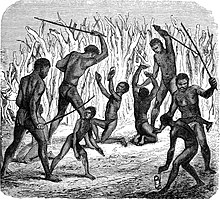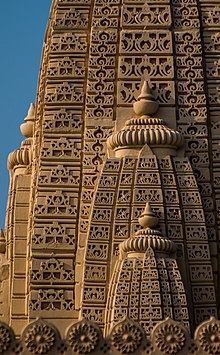Religion in Israel is manifested primarily in Judaism, the ethnic religion of the Jewish people. The State of Israel declares itself as a "Jewish and democratic state" and is the only country in the world with a Jewish-majority population. Other faiths in the country include Islam, Christianity and the religion of the Druze people. Religion plays a central role in national and civil life, and almost all Israeli citizens are automatically registered as members of the state's 14 official religious communities, which exercise control over several matters of personal status, especially marriage. These recognized communities are Orthodox Judaism, Islam, the Druze faith, the Catholic Church, Greek Orthodox Church, Syriac Orthodox Church, Armenian Apostolic Church, Anglicanism, and the Baháʼí Faith.

Islam is the majority religion in Azerbaijan, but the country is considered to be the most secular in the Muslim world. Estimates include 97.3% and 99.2% of the population identifying as Muslim. Of these, a majority belong to the Shia branch (55-65%), while a significant minority (35-45%) are Sunni. Traditionally, the differences between these two branches of Islam have not been sharply defined in Azerbaijan.

The official religion of Pakistan is Islam, as enshrined by Article 2 of the Constitution, and is practised by approximately 96.47% of the country's population. The remaining 3.53% practice Hinduism, Christianity, Ahmadiyya Islam, Sikhism and other religions.
Religion in Iraq dates back to Ancient Mesopotamia, particularly Sumer, Akkad, Assyria and Babylonia between circa 3500 BC and 400 AD, after which they largely gave way to Syriac Christianity and later to Islam.
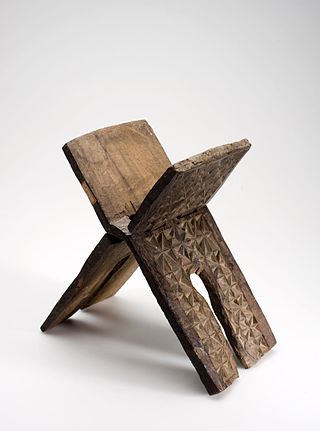
Islam is a minority religion within the Democratic Republic of the Congo, where the large majority of the population is affiliated with various Christian denominations and sects. It was first introduced to the Congo basin from the East African coast during the 19th century and remains largely concentrated in parts of Eastern Congo, notably in Maniema Province. Most Congolese Muslims are Sunni and follow the Shafi‘i and Maliki school of jurisprudence (fiqh). Though estimates vary, it is generally believed that between one and 10 percent of the country's population identify as Muslim.

Religion in Ethiopia consists of a number of faiths. Among these mainly Abrahamic religions, the most numerous is Christianity totaling at 67.3%, followed by Islam at 31.3%. There is also a longstanding but small Ethiopian Jewish community. Some adherents of the Baháʼí Faith likewise exist in a number of urban and rural areas. Additionally, there is also a substantial population of the adherents of traditional faiths.

Islam is a minority religion in Burundi where approximately 90 percent of the national population are followers of Christianity. Between 2–5 percent of the population identifies as Muslim, according to a 2010 estimate by the United States Department of State. The same year, the Pew Research Centre estimated that there were 230,000 Muslims in Burundi, equivalent to 2.8 percent of Burundi's 8.4 million inhabitants.
Growth of religion involves the spread of individual religions and the increase in the numbers of religious adherents around the world. In sociology, desecularization is the proliferation or growth of religion, most commonly after a period of previous secularization. Statistics commonly measure the absolute number of adherents, the percentage of the absolute growth per-year, and the growth of converts in the world.

Afghanistan is an Islamic state, in which most citizens follow Islam. As much as 90% of the population follows Sunni Islam. According to The World Factbook, Sunni Muslims constitute between 84.7 and 89.7% of the population, and Shia Muslims between 10 and 15%. Other religions are followed by 0.3% of the population.
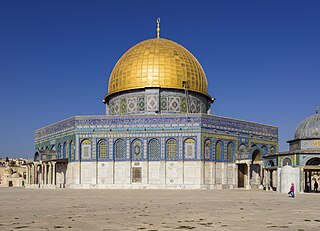
Islam is the second-largest religion in Israel, constituting 1.707 million and around 18.1% of the country's population as of 2022. The ethnic Arab citizens of Israel make up the majority of its Muslim population, making them the largest minority group in Israel.

Religion in Algeria is dominated by Muslims, with nearly ninety-eight of the population adhering to Sunni Islam of the Maliki school of jurisprudence, as of 2020. The remainder include other Islamic schools and branches, Christian denominations, Baháʼís and Jews. Estimates of the Christian population range from 71,000 to 200,000. The latest available estimates suggest a Baháʼí population of 3,300, and a Jewish community of less than 200 people.

Islam is the dominant religion in Libya.

Yemen is an Islamic society. Nearly all Yemenis are Muslims, with approximately 60% belonging to Sunni Islam and 40% belonging to Shia Islam (Zaidi). Amongst the native population, there were approximately 1,000 Christians, and 6 remaining Jews in 2016. However, Pew-Templeton estimates the number of Christians to be as high as 40,000, though most do not publicly identify as such, due to fears of religious persecution. According to WIN/Gallup International polls, Yemen has the most religious population among Arab countries and it is one of the most religious populations world-wide.

Christianity is the largest religion in Benin, with substantial populations of Muslims and adherents of traditional faiths. According to the most recent 2020 estimate, the population of Benin is 52.2% Christian, 24.6% Muslim, 17.9% traditionalist and 5.3% follows other faiths or has no religion.

Christianity is the largest religion in Tanzania, with a substantial Muslim minority. Smaller populations of Animists, practitioners of other faiths, and religiously unaffiliated people are also present.

Christianity is the predominant religion in Eswatini, with Protestantism being its largest denomination.

Christianity is the dominant religion in Lesotho, with Protestantism and Catholicism being its main denominations.

Religion in Eritrea consists of a number of faiths. The two major religions in Eritrea are Christianity and Islam. However, the number of adherents of each faith is subject to debate. Estimates of the Christian share of the population range from 47% and 63%, while estimates of the Muslim share of the population range from 37% to 50%.
Christian population growth is the population growth of the global Christian community. According to a 2011 Pew Research Center survey, there were more than 2.2 billion Christians around the world in 2010, more than three times as many as the 600 million recorded in 1910. However, this rate of growth is slower than the overall population growth over the same time period. In 2020, Pew estimated the number of Christians worldwide to be around 2.38 billion. According to various scholars and sources, high birth rates and conversions in the Global South were cited as the reasons for the Christian population growth. In 2023, it was reported: "There will be over 2.6 billion Christians worldwide by the middle of 2023 and around 3.3 billion by 2050, according to a report published in early January by the Center for the Study of Global Christianity at Gordon Conwell Theological Seminary."
The main religion in Morocco is Sunni Islam, which is also the state religion of the country. Officially, 99% of the population are Muslim, and virtually all of those are Sunni. The second-largest religion in the country is Christianity, but most Christians in Morocco are foreigners. There is a community of the Baháʼí Faith. Only a fraction of the former number of Maghrebi Jews have remained in the country, many having moved to Israel.
